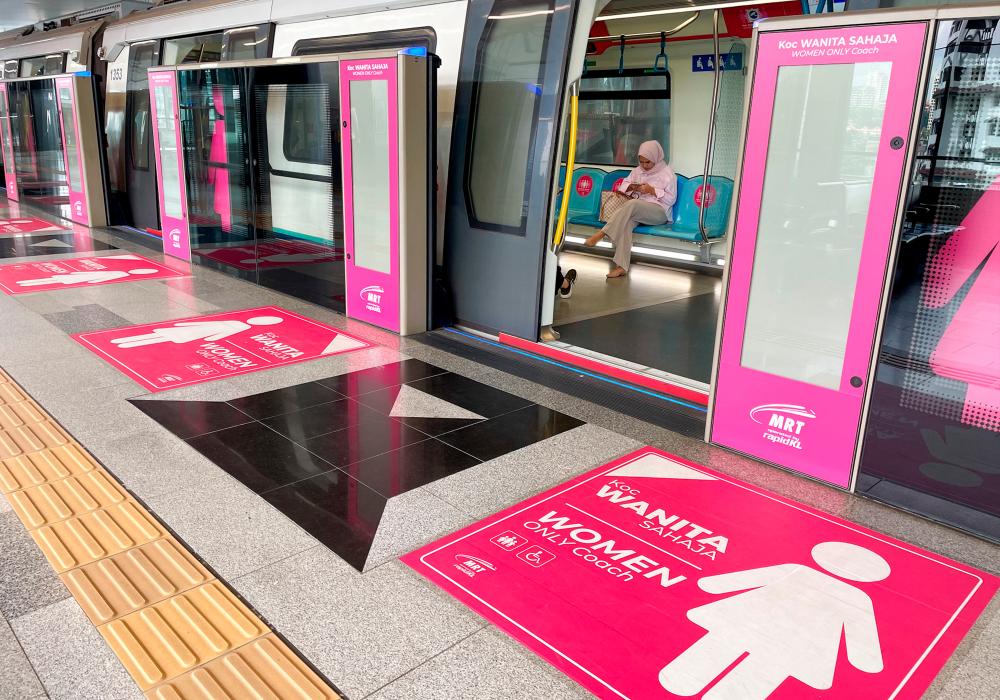PETALING JAYA: A recent Facebook announcement by RapidKL about introducing a women-only coach on the LRT Ampang/Sri Petaling line, that was set to take effect yesterday, has sparked online debates.
While some praise the initiative as a step towards enhancing women’s safety, others have accused the company of fostering gender segregation, with some commentators suggesting women should pay more for designated areas, and labelling women-only coaches as a “luxury”.
All Women’s Action Society (Awam) assistant advocacy officer Alyssa L.A. Pong said such coaches provide immediate safety for women using public transport.
She said there is a global precedent for women-only coaches, and pointed out that they are a “short-term solution to the deeply troubling issue of sexual harassment”.
“Women’s coaches have been introduced worldwide to address safety concerns and reduce sexual harassment,” she said, adding that previous initiatives on KTM Komuter and RapidKL’s Kajang MRT line have led to a reduction in such complaints, which decreased from an average of 3.2 cases per month to just two.
However, Pong cautioned that such measures alone cannot address the root causes of gender-based violence and that women should not have to segregate themselves to feel safe in public spaces.
She added that women should not be held solely responsible for addressing sexual harassment and that Awam advocates a comprehensive societal change to challenge and dismantle the culture of harassment.
She also dismissed criticisms that women’s coaches are a “luxury” and asserted that they are a “necessity”.
“Women make up 60% of rail passengers, and many alter their travel routes due to safety concerns. Women’s coaches are not a privilege but an attempt to address our fears and enable safer commutes.”
Pong recommended implementing broader initiatives, including awareness campaigns, bystander intervention training and improved reporting mechanisms to create a safer environment.
She stressed the importance of infrastructure improvements, such as well-lit waiting areas and increased train frequency, to comprehensively enhance public safety.
“We also need to tackle the root causes of harassment through education and advocacy, and engage men and boys as allies in building a safer society for everyone.
“More can be done to educate the public on sexual harassment, including launching awareness campaigns with impactful posters, videos and trained personnel.”
Pong said public transport harassment cases often go unreported and called for systematic data collection.
She urged the Transport Ministry, RapidKL and civil society organisations to regularly monitor rail passenger perceptions of safety and comfort, as well as the actual number of sexual harassment cases.
“Reliable data is essential to evaluate whether the measures being taken make a genuine impact and if adjustments are required.”
Meanwhile, Women’s Aid Organisation (WAO) acting executive director Nazreen Nizam said women-only coaches should not become a permanent solution as it reinforces stereotypes of women’s vulnerability.
She argued that the focus should shift to creating public spaces where everyone, regardless of gender,
feels safe.
Nazreen emphasised the need for systemic changes, including better staff training to handle harassment cases, stronger enforcement of laws and regular monitoring of public transport safety.
“Public awareness campaigns must challenge the normalisation of harassment and foster a culture of respect and accountability.”
She said society should strive for integration and mutual respect rather than creating isolated spaces, adding that WAO advocates collective responsibility in addressing societal norms that perpetuate harassment.
She recommended introducing quick reporting mechanisms such as emergency buttons and mobile apps, increasing the presence of security personnel and improving CCTV coverage.
“Safety is not a luxury, and it should not come at the expense of equality. We must work towards a society in which women and men feel equally safe and respected in shared spaces.”









